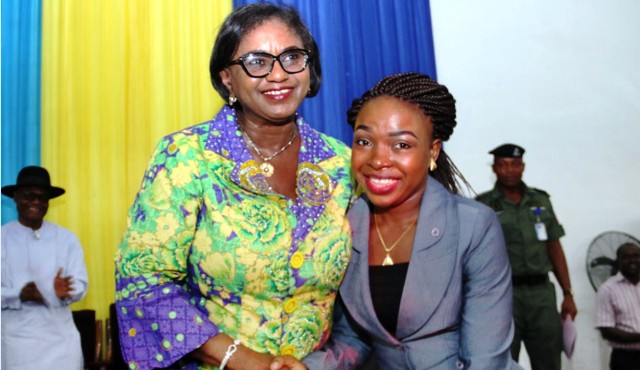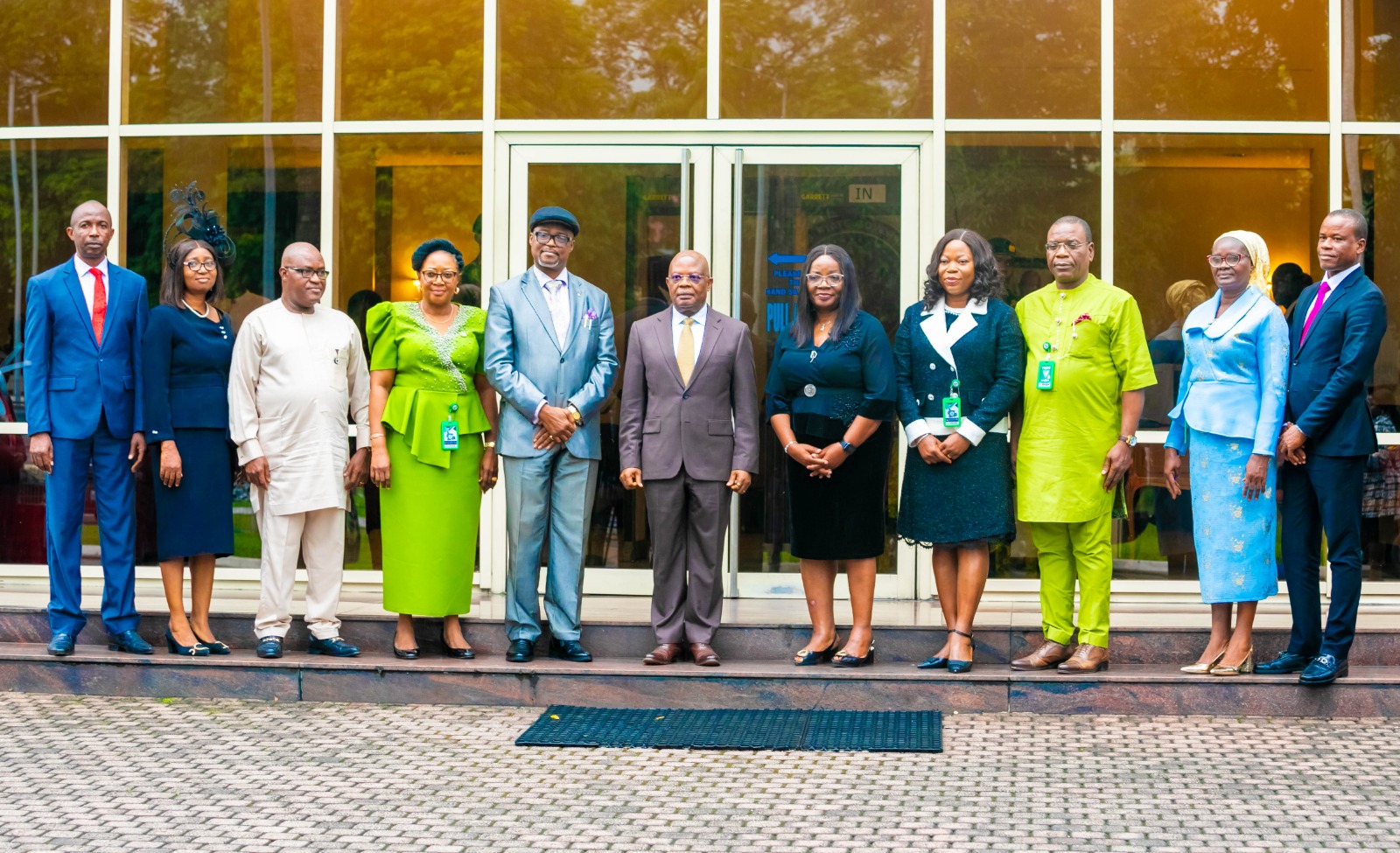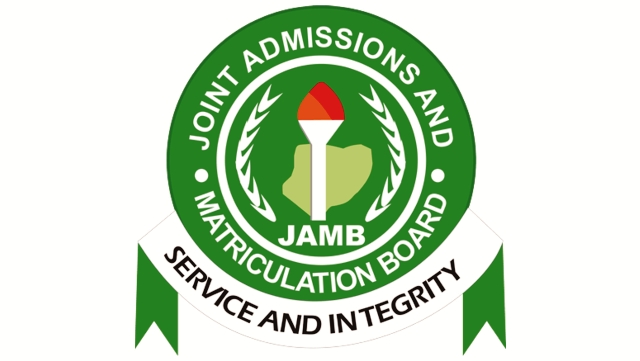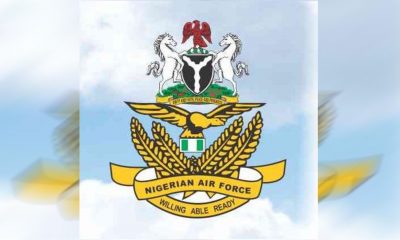Featured
Adoke Fingers Ex-Presidents In $1.2bn Malabu Deal

A former Attorney General of the Federation and Minister of Justice, Mohammed Bello Adoke (SAN), has insisted that the controversial Malabu oil block agreement was endorsed by the previous administrations of Presidents Olusegun Obasanjo, Umaru Musa Yar’Adua and Goodluck Jonathan.
In an official letter written to his successor, Abubakar Malami (SAN), Adoke, said: “I believe it is your responsibility to explain to the public who are being sold a fiction that the transaction started from President Olusegun Obasanjo, GCFR under whose administration the Terms of Settlement were brokered with Chief Bayo Ojo, SAN, as the then Attorney General who executed the Terms of Settlement before the tenure of President Goodluck Ebele Jonathan, GCFR who approved the final implementation of the Terms of Settlement and my humble self who executed the resolution agreements. This is more so as the Settlement and its implementation were situated in the Federal Ministry of Justice.
Adoke Adoke, who is currently facing two separate criminal charges over alleged role he played in relation to the disputed Oil Prospecting License, OPL, 245, via a letter dated March 6, challenged his predecessor, Mr. Abubakar Malami, SAN, to go ahead and reveal to Nigerians that the said illicit transaction started under the watch of the ex-President. OPL 245 is regarded as one of the biggest oil blocs in Africa.
FG had alleged that Adoke, a former Minister of Petroleum, Dan Etete, an oil mogul, Aliyu Abubakar and Malabu Oil & Gas Ltd, had sometime in 2000, corruptly received the aggregate sum of $801,000,000.00 (Eight hundred and one million Dollars) in relation to the grant of oil prospecting license in respect of OPL 245 from Shell Nigeria Exploration Production Company, Nigeria Agip Exploration Ltd, and ENI SPA.
It told the Federal High Court in Abuja that investigations revealed that Malabu Oil and Gas Ltd and SPDC secured OPL 245 through fraudulent scheme involving high scale bribery and corruption by top management of the company and some government officials. Aside Shell and Agip who are still laying claim to the controversial oil bloc, FG also cited four Italians, Ralph Wetzels, Casula Roberto, Pujatti Stefeno, Burrafati Sebestiano and ENI SPA, as defendants in the suit marked CR/124/17 and dated February 28, pending before the high court.
Meanwhile, in his letter, Adoke, insisted that the deal was brokered by the ex-President with the Terms of Settlement executed by the then AGF, Chief Bayo Ojo, SAN.
He maintained that the deal was concluded before the tenure of former President Goodluck Jonathan who he said approved the final implementation of the Terms of Settlement.
Adoke said he only executed the resolution agreements since the implementation was situated in the Federal Ministry of Justice, saying recent actions of the Economic and Financial Crimes Commission, EFCC, “was to impugn a settlement done in the national interest”.
While tasking Malami to reveal the truth, Adoke said, “As the Chief Law Officer of the Federation, you have a public duty to speak on this matter so that Nigerians would know whether I acted mala fide or abused my office in the entire transaction leading to the final implementation of the Settlement.
On the recently filed charges against him and others by the Economic and Financial Crimes Commission, Adoke stated: “Recent actions of the Economic and Financial Crimes Commission (EFCC) to impugn the settlement which was done in the national interest particularly their penchant to suppress facts relating to the transaction and the filing of criminal charges against me for conspiracy/ aiding the commission of Money Laundering offence and the latest allegations of bribe taking reveal very clearly that either your Office and that of the EFCC are not working in harmony or that something sinister is going on.
“Having given you the benefit of the doubt that you would not sponsor deliberate falsehood against me, my suspicion is that there is an orchestrated plot by the EFCC to: deliberately impugn a transaction that has been scrutinized and approved by at least three past Presidents and three Attorneys General; drag my name in the mud and paint me with the tar of corruption in order to attract public odium.”
Adoke also advised Malami: “As the Chief Law Officer of the Federation, you have a public duty to speak on this matter so that Nigerians would know whether I acted mala fide or abused my office in the entire transaction leading to the final implementation of the Settlement. Nigerians need to know whether your predecessors in office from 2006 to May 2015 acted in the national interest when they brokered and implemented the Settlement.
However, recent actions of the Economic and Financial Crimes Commission (EFCC) to impugn the settlement which was done in the national interest particularly their penchant to suppress facts relating to the transaction and the filing of criminal charges against me for conspiracy/ aiding the commission of Money Laundering offence and the latest allegations of bribe taking reveal very clearly that either your Office and that of the EFCC are not working in harmony or that something sinister is going on.
Having given you the benefit of the doubt that you would not sponsor deliberate falsehood against me, my suspicion is that there is an orchestrated plot by the EFCC to: deliberately impugn a transaction that has been scrutinized and approved by at least three past Presidents and three Attorneys General; drag my name in the mud and paint me with the tar of corruption in order to attract public odium.
As the Chief Law Officer of the Federation, you have a public duty to speak on this matter so that Nigerians would know whether I acted mala fide or abused my office in the entire transaction leading to the final implementation of the Settlement. Nigerians need to know whether your predecessors in office from 2006 to May 2015 acted in the national interest when they brokered and implemented the Settlement. It will also be instructive for Nigerians to know whether your predecessors were carrying out their personal agenda or that their respective actions were carried out with the knowledge and approval of their respective Principals.
“You will recall that I had on several occasions asserted this fact.
I am therefore surprised that a national institution is being used to further the interest of individuals whose claim or shareholding in Malabu remains shady and prefer to engage proxies to fight their battles.
“If you find that I had breached my Oath of Office or abused my office, please do not hesitate to bring me to justice.
However, if it is the contrary, as I strongly believe, that certain individuals who had vowed to even scores with me are now being aided by state institutions such as the EFCC; I deserve protection from these unwarranted attacks and dehumanising treatment that I am being subjected to merely because I chose to serve my fatherland.”
Meantime, Justice John Tsoho of the Federal High Court in Abuja will on Monday, determine whether or not Shell and Agip should be allowed to retain ownership of the disputed OPL 245, pending their trial over the alleged $1.2billion fraud.
Featured
Rivers A Strategic Hub for Nigeria’s Blue Economy -Ibas …Calls For Innovation-Driven Solutions

The Administrator of Rivers State, Vice Admiral (Rtd.) Ibok-Ete Ibas, has emphasized the need for innovation-driven strategies, strategic partnerships, and firm policy implementation to fully harness the vast potential of the blue economy.
Speaking during a courtesy visit by participants of Study Group 7 of the Executive Course 47 from the National Institute for Policy and Strategic Studies (NIPSS) at Government House, Port Harcourt, on Monday, Ibas highlighted the importance of diversifying Nigeria’s economy beyond oil by leveraging maritime resources to create jobs, enhance food security, strengthen climate resilience, and generate sustainable revenue.
The Administrator, according to a statement by his Senior Special Adviser on Media, Hector Igbikiowubo, noted that with coordinated efforts and innovative solutions, the blue economy could serve as a catalyst for inclusive growth, economic stability, and long-term environmental sustainability.
“It is estimated that a fully developed blue economy could generate over $296 million annually for Nigeria, spanning fisheries, shipping and logistics, marine tourism, offshore renewable energy, aquaculture, biotechnology, and coastal infrastructure,” he stated.
“We must transition from extractive practices to regenerative, inclusive, and innovation-driven solutions. This requires political cohesion, intergovernmental collaboration, robust infrastructure, and institutional capacity—all of which must be pursued with urgency and intentionality,” he added.
Ibas urged sub-national governments, particularly coastal states, to domesticate the national blue economy framework and develop tailored strategies that reflect their comparative advantages.
He stressed that such efforts must be guided by disciplined planning, regulation, and investment to maximize the sector’s potential.
Highlighting Rivers State’s pivotal role, the Administrator outlined its strategic advantages as follows:
•Nearly 30% of Nigeria’s total coastline (approximately 853km)
•Over 40% of Nigeria’s crude oil and gas output
•More than 33% of the country’s GDP and foreign exchange earnings
•416 of Nigeria’s 1,201 oil wells, many located in marine environments
•Two of Nigeria’s largest seaports, two oil refineries, and the Nigerian Liquefied Natural Gas (NLNG) terminal in Bonny Island—one of Africa’s most advanced gas facilities
Despite these opportunities, Ibas acknowledged challenges such as pollution, coastal erosion, illegal oil refining, unregulated fishing, inadequate infrastructure, and maritime insecurity.
He reaffirmed his administration’s commitment to institutional reforms, coastal zone management, and inter-agency collaboration to build a governance structure that supports a sustainable blue economy.
“Sustainability must be embedded in our development models from the outset, not as an afterthought. We are actively exploring partnerships in maritime education, aquaculture development, port modernization, and renewable ocean energy. We welcome knowledge-sharing engagements like this to refine our strategies and enhance implementation,” he said.
He urged the NIPSS delegation to ensure their findings translate into actionable recommendations that address the sector’s challenges.
Leader of the delegation, Vice Admiral A.A. Mustapha, explained that the visit aligns with their strategic institutional tour mandate on the 2025 theme: “Blue Economy and Sustainable Development in Nigeria: Issues, Challenges, and Opportunities.”
The group is engaging stakeholders to deepen understanding of policy efforts and institutional roles in advancing sustainable development through the blue economy.
Featured
INEC To Unveil New Party Registration Portal As Applications Hit 129

The Independent National Electoral Commission (INEC) has announced that it has now received a total of 129 applications from associations seeking registration as political parties.
The update was provided during the commission’s regular weekly meeting held in Abuja, yesterday.
According to a statement signed by the National Commissioner and Chairman of the Information and Voter Education Committee, Sam Olumekun, seven new applications were submitted within the past week, adding to the previous number.
“At its regular weekly meeting held today, Thursday 10th July 2025, the commission received a further update on additional requests from associations seeking registration as political parties.
“Since last week, seven more applications have been received, bringing the total number so far to 129. All the requests are being processed,” the commission stated.
The commission revealed the introduction of a new digital platform for political party registration. The platform is part of the Party Financial Reporting and Auditing System and aims to streamline the registration process.
Olumekun disclosed that final testing of the portal would be completed within the next week.
“INEC also plans to release comprehensive guidelines to help associations file their applications using the new system.
“Unlike the manual method used in previous registration, the Commission is introducing a political party registration portal, which is a module in our Party Financial Reporting and Auditing System.
“This will make the process faster and seamless. In the next week, the commission will conclude the final testing of the portal before deployment.
“Thereafter, the next step for associations that meet the requirements to proceed to the application stage will be announced. The commission will also issue guidelines to facilitate the filing of applications using the PFRAS,” the statement added.
In the meantime, the list of new associations that have submitted applications has been made available to the public on INEC’s website and other official platforms.
Featured
Tinubu Signs Four Tax Reform Bills Into Law …Says Nigeria Open For Business

President Bola Tinubu yesterday signed into law four tax reform bills aimed at transforming Nigeria’s fiscal and revenue framework.
The four bills include: the Nigeria Tax Bill, the Nigeria Tax Administration Bill, the Nigeria Revenue Service (Establishment) Bill, and the Joint Revenue Board (Establishment) Bill.
They were passed by the National Assembly after months of consultations with various interest groups and stakeholders.
The ceremony took place at the Presidential Villa, yesterday.
The ceremony was witnessed by the leadership of the National Assembly and some legislators, governors, ministers, and aides of the President.
The presidency had earlier stated that the laws would transform tax administration in the country, increase revenue generation, improve the business environment, and give a boost to domestic and foreign investments.
“When the new tax laws become operational, they are expected to significantly transform tax administration in the country, leading to increased revenue generation, improved business environment, and a boost in domestic and foreign investments,” Special Adviser to the President on Media, Bayo Onanuga said on Wednesday.
Before the signing of the four bills, President Tinubu had earlier yesterday, said the tax reform bills will reset Nigeria’s economic trajectory and simplify its complex fiscal landscape.
Announcing the development via his official X handle, yesterday, the President declared, “In a few hours, I will sign four landmark tax reform bills into law, ushering in a bold new era of economic governance in our country.”
Tinubu made a call to investors and citizens alike, saying, “Let the world know that Nigeria is open for business, and this time, everyone has a fair shot.”
He described the bills as not just technical adjustments but a direct intervention to ease burdens on struggling Nigerians.
“These reforms go beyond streamlining tax codes. They deliver the first major, pro-people tax cuts in a generation, targeted relief for low-income earners, small businesses, and families working hard to make ends meet,” Tinubu wrote.
According to the President, “They will unify our fragmented tax system, eliminate wasteful duplications, cut red tape, restore investor confidence, and entrench transparency and coordination at every level.”
He added that the long-standing burden of Nigeria’s tax structure had unfairly weighed down the vulnerable while enabling inefficiency.
The tax reforms, first introduced in October 2024, were part of Tinubu’s post-subsidy-removal recovery plan, aimed at expanding revenue without stifling productivity.
However, the bills faced turbulence at the National Assembly and amongst some state governors who rejected its passing in 2024.
At the NASS, the bills sparked heated debate, particularly around the revenue-sharing structure, which governors from the North opposed.
They warned that a shift toward derivation-based allocations, especially with VAT, could tilt fiscal balance in favour of southern states with stronger consumption bases.
After prolonged dialogue, the VAT rate remained at 7.5 per cent, and a new exemption was introduced to shield minimum wage earners from personal income tax.
By May 2025, the National Assembly passed the harmonised versions with broad support, driven in part by pressure from economic stakeholders and international observers who welcomed the clarity and efficiency the reforms promised.
In his tweet, Tinubu stressed that this is just the beginning of Nigeria’s tax evolution.
“We are laying the foundation for a tax regime that is fair, transparent, and fit for a modern, ambitious Nigeria.
“A tax regime that rewards enterprise, protects the vulnerable, and mobilises revenue without punishing productivity,” he stated.
He further acknowledged the contributions of the Presidential Fiscal Policy and Tax Reform Committee, the National Assembly, and Nigeria’s subnational governments.
The President added, “We are not just signing tax bills but rewriting the social contract.
“We are not there yet, but we are firmly on the road.”
-
Politics2 days ago
Bayelsa APC Hails Late Buhari As Change Agent In Nigerian Politics
-

 News2 days ago
News2 days agoShettima, Atiku, Obi Attend Buhari’s Fidau Prayer In Daura
-

 News2 days ago
News2 days agoJAMB Uncovers 9,469 Fake Admissions In 20 Tertiary Institutions
-

 News2 days ago
News2 days agoNAF Disowns Recruitment Adverts, Says It’s Fake
-
Nation2 days ago
Alumni, Others Launch Campus Care Initiative In Port Harcourt
-
News2 days ago
Rivers Chief Judge Frees 21 Awaiting Trial Inmates
-
Politics2 days ago
Natasha’s Counsel Writes Senate Over Court Judgment
-
Nation2 days ago
NIPR Practitioners Urge To Go Beyond Traditional Media Relations To Strategic Leadership Functions

